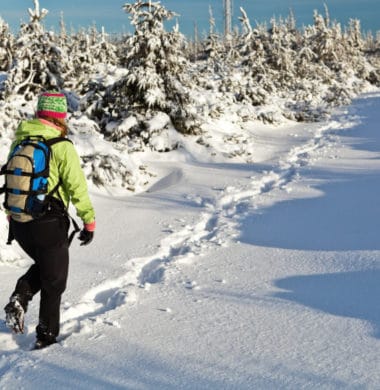Cold Weather Precautions for People with Heart Disease

February is American Heart Month. Throughout February, medical experts will emphasize raising awareness for common heart health issues impacting individuals throughout the country. According to the American Heart Association, heart disease is the greatest health threat to Americans and the leading cause of death worldwide.
At South Denver Cardiology Associates, we want to commemorate American Heart Month by providing some important tips on maintaining optimal heart health during the cold winter weather we experience in the Denver area. If you have heart disease, it’s especially crucial that you take precautions to protect your heart during cold weather. The cold weather can trigger heart attacks and many other serious heart conditions. Fortunately, there are steps you can take to reduce this risk.
Why Does Cold Weather Negatively Impact Heart Health?
Cold weather places additional stress on your body and forces you to make physiological adjustments to maintain a proper core body temperature. While these adjustments are manageable for people with healthy hearts, they create challenges for heart disease individuals.
Your body may experience the following changes as it tries to cope with cold temperatures:
- Increased heart rate
- Increased blood pressure
- Increased likelihood of blood clotting
- Your heart works harder
- Blood vessels contract
Also, it’s more common to engage in strenuous physical activity in cold weather. Activities such as shoveling heavy snow or trudging through deep snow accumulations can place a strain on your heart. This strain is much more dangerous for individuals with heart disease and may increase their risk of a heart attack during the winter months.
6 Important Winter Precautions to Minimize Your Risk of Heart Issues
While it’s a good idea for everyone to take precautions in the cold weather, the following tips are especially crucial for individuals suffering from heart disease:
Limit exposure to cold temperatures – Dress warmly whenever you go outside. Wear several layers, cover your head with a hat, use gloves on your hands, and wear warm socks and shoes. If at all possible, limit the length of time you spend outside. If you need to be out for prolonged periods of time, take breaks to come inside and warm up.
- Avoid overexertion – Overexertion can often trigger a cardiac emergency. Take all necessary steps to avoid overexertion in the winter, such as shoveling heavy snow, walking briskly into a strong wind, or pushing a car out of a snowbank. If you must shovel snow, do it before a significant amount accumulates. If a storm brings particularly heavy, wet snow, do not shovel. Instead, find someone to assist you with this task.
- Avoid overheating – While it’s important to dress warmly when you’re outside in the cold weather, you also run the risk of overheating when you engage in physical activity. Overheating will cause your blood vessels to dilate, resulting in a significant drop in blood pressure. Low blood pressure reduces the heart’s blood supply, which can trigger a heart attack if you suffer from coronary disease. If you find yourself sweating, the best approach is to go inside and take a break from your activity. If this isn’t possible, remove a layer until you cool down.
- Get a flu shot – Winter is flu season. If you suffer from heart disease, the flu can be especially dangerous. When you run a fever, your heart beats faster, increasing the amount of oxygen it needs. Simultaneously, dehydration from the flu will lower your blood pressure, reducing your heart’s supply of oxygen. This combination can potentially trigger a heart attack. A flu shot is a smart precaution that all people with heart disease should take every winter. If you develop flu symptoms, speak to your doctor at once.
- Reduce your alcohol consumption – Alcohol expands the blood vessels in your skin, making you feel warmer than you actually are. Avoid drinking before going outside for extended periods of time to prevent your body temperature from dropping to dangerously low levels.
- Fill prescriptions in advance – Snowy, icy weather can hit at any moment. You don’t want to run out of important medications and find that you’re stuck in the house during a snowstorm. Make sure you fill prescriptions far enough in advance to ensure you don’t run out when a major storm hits.
South Denver Cardiology Associates Can Help
At South Denver Cardiology Associates, we offer comprehensive clinical cardiology services to address just about any heart condition you may experience. Our team will educate you on important steps you should take daily to manage your heart condition. This may involve lifestyle changes or some of the winter heart health tips listed above.
Also, we offer a variety of services to help you take control of your heart health. These include:
Please contact us today to schedule an appointment. South Denver Cardiology Associates serves patients in Denver, Littleton, and throughout the surrounding areas of Colorado.
- 6 Tips for Exercising Outdoors with a Heart Condition - May 19, 2025
- Lifestyle Changes That Can Help Manage Arrhythmia - April 30, 2025
- Common Treatments for Peripheral Vascular Disease - April 23, 2025
Sign Up
As with any health concerns, your specific treatment program should be discussed thoroughly with your primary care physician as well as any specialists who may need to be consulted – like a cardiologist.
Sign Up

 Limit exposure to cold temperatures – Dress warmly whenever you go outside. Wear several layers, cover your head with a hat, use gloves on your hands, and wear warm socks and shoes. If at all possible, limit the length of time you spend outside. If you need to be out for prolonged periods of time, take breaks to come inside and warm up.
Limit exposure to cold temperatures – Dress warmly whenever you go outside. Wear several layers, cover your head with a hat, use gloves on your hands, and wear warm socks and shoes. If at all possible, limit the length of time you spend outside. If you need to be out for prolonged periods of time, take breaks to come inside and warm up.